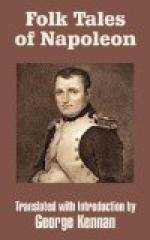“Forward!” shouted our officers. “Here comes the Emperor!” And there he was, passing at a gallop, and motioning to us that it was very important to capture the redoubt. He put new life into us, and on we ran. I was the first to reach the ravine. Ah! Mon Dieu! How the colonels are falling, and the lieutenants, and the soldiers! But never mind! There’ll be all the more shoes for those who haven’t any, and epaulets for the ambitious fellows who know how to read.
At last the cry of “Victory!” rang all along the line; but—would you believe it?—there were twenty-five thousand Frenchmen lying on the ground! A trifle, eh? Well, such a thing had never been seen before. It was a regular harvest field after the reaping; only instead of stalks of grain there were bodies of men. That sobered the rest of us. But the Emperor soon came along, and when we formed a circle around him, he praised us and cheered us up (he could be very amiable when he liked), and made us feel quite contented, even although we were as hungry as wolves. Then he distributed crosses of honor among us, saluted the dead, and said, “On to Moscow!”
“All right! To Moscow!” replied the army.
And then what did the Russians do but burn their city! It made a six-mile bonfire which blazed for two days. The buildings fell like slates, and there was a rain of melted iron and lead which was simply horrible! Indeed, that fire was the lightning from the dark cloud of our misfortunes. The Emperor said: “There’s enough of this. If we stay here, none of my soldiers will ever get out.” But we waited a little to cool off and to refresh our carcasses; because we were really played out. We carried away a golden cross that was on the Kremlin, and every soldier had a small fortune.
On our way back, winter came upon us, a month earlier than usual,—a thing that those stupid scientific men have never properly explained,—and the cold caught us. Then there was no more army; do you understand? No army, no generals, no sergeants even! After that it was a reign of misery and hunger—a reign where we were all equal. We thought of nothing except of seeing France again. Nobody stooped to pick up his gun, or his money, if he happened to drop them; and every one went straight on, arms at will, caring nothing for glory. The weather was so bad that Napoleon could no longer see his star—the sky was hidden. Poor man! It made him sick at heart to see his eagles flying away from victory. It was a crushing blow to him.
Well, then came the Beresina. And now, my friends, I may say to you, on my honor and by everything sacred, that never—no, never since man lived on earth—has there been such a mixed up hodgepodge of army, wagons, and artillery, in the midst of such snows, and under such a pitiless sky! It was so cold that if you touched the barrel of your gun you burned your hand.




